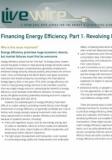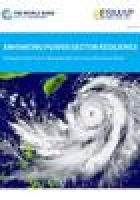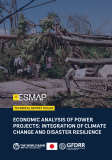Publications
Over the past 20 years, natural disasters have become more frequent, and the costs of associated damages and losses are rising. In 2012 alone, the 357 natural disasters recorded worldwide resulted in 9,655 fatalities, 125 million victims, and US$157 billion in associated damages and losses. Far‐flung power infrastructure from upstream generation plants and transmission lines to downstream distribution networks and operational systems is particularly vulnerable to weather and geological events. Building a resilient power sector is likely to be particularly challenging in countries where the power supply system is weak or aging, which is the case in many developing countries.
The World Bank Group’s Energy Sector Management Assistance Program (ESMAP), in collaboration with Global Facility for Disaster Risk Reduction, undertook this study to (i) raise awareness and enhance understanding about managing extreme weather and geological risks among power sector stakeholders and (ii) enhance their capacity to take adaptive actions to mitigate these risks and cope with the impacts when disasters happen. The study catalogs the risks faced by the power sector as a result of weather and geological hazards; identifies and documents a range of emerging resilience standards; covers the entire power‐system value chain; and focuses on the present‐day concerns of vulnerable power utilities.
Survey | Power Sector Resilience - Regulator and Financiers
Survey | Power Sector Resilience
Wang, Xiaoping; Brown, Ray; Prudent‐Richard, Guillaume; O’Mara, Katrina. 2016. Enhancing Power Sector Resilience: Emerging Practices to Manage Weather and Geological Risks. Energy Sector Management Assistance Program. Washington, D.C.: World Bank Group. http://documents.worldbank.org/curated/en/469681490855955624/Enhancing-power-sector-resilience-emerging-practices-to-manage-weather-and-geological-risks


